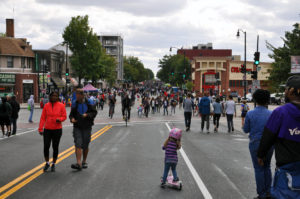Dear Friend,
First of all, we hope you and your families are coping as best you can under the circumstances. This is a time for us all to work together and support each other — even as it means staying physically apart to stem the spread of COVID-19 and protect the most vulnerable among us.
The CSG team went to full-telecommuting mode on Friday. We are postponing some events and converting others to webinars. Please see the current event list below.
We will not slacken our efforts to promote and win a more sustainable way to grow in the DC region. Our work is important for people to have homes they can afford, streets where it’s safe to walk, affordable transit that connects to jobs and opportunity, and healthy air and water. Walkable, bikeable, transit-accessible communities are also critical for reducing the emissions that cause climate change, an existential threat to all of us.
Here is our updated calendar of CSG events:
3/21 — Healthier Streams for Healthier Communities Walk with CSG, Audubon Naturalist Society, and Fairfax County staff (Rescheduled to June 13)
3/26 — Conservation Cafe with CSG, Audubon Naturalist Society, Fairfax Alliance for Better Bicycling, the Virginia League of Conservation Voters, Faith Alliance for Climate Solutions, and EcoAction Arlington (Converted to webinar, information to follow)
4/2 — Montgomery County Homeowner Accessory Dwelling Unit Workshop with Habitat for Humanity Metro Maryland and Ileana Schinder (Postponed, new date to be determined, probable webinar)
4/4, 4/18, 4/25 — Courageous Conversations on Housing, Land Use, and Racism (Postponed, new date to be determined)
4/21 — Livable Communities Leadership Award event (Postponed, new date to be determined)
Look for updates from CSG on a menu of educational webinars that will not only help us advance smarter growth but keep us all connected and engaged.
It is our hope that we will come through the current health crisis committed to working together to address the many challenges we face as people who share this earth – realizing a more sustainable and equitable future for everyone.
All the best to each of you. May you and your families stay well.
Stewart
—
Stewart Schwartz
Coalition for Smarter Growth
Thank you to Joe Flood for his photograph “Almost There”


